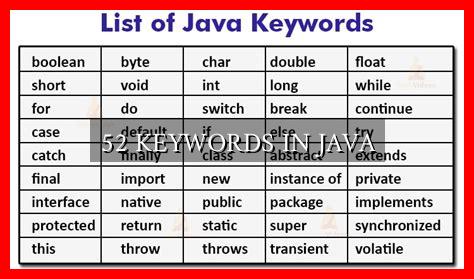-
Table of Contents
- 52 Keywords in Java
- 1. abstract
- 2. assert
- 3. boolean
- 4. break
- 5.
. byte
- 6. case
- 7. catch
- 8. char
- 9. class
- 10. const
- 11. continue
- 12. default
- 13. do
- 14. double
- 15. else
- 16. enum
- 17. extends
- 18. final
- 19. finally
- 20. float
- 21. for
- 22. goto
- 23. if
- 24. implements
- 25. import
- 26. instanceof
- 27. int
- 28. interface
- 29. long
- 30. native
- 31. new
- 32. null
- 33. package
- 34. private
- 35. protected
- 36. public
- 37. return
- 38. short
- 39. static
- 40. strictfp
- 41. super
- 42. switch
52 Keywords in Java
Java is one of the most popular programming languages in the world, known for its versatility and robustness. Whether you are a beginner or an experienced developer, understanding key Java keywords is essential for writing efficient and effective code. In this article, we will explore 52 important keywords in Java that every programmer should know.
1. abstract
The abstract keyword is used to declare abstract classes and methods in Java. Abstract classes cannot be instantiated, and methods declared as abstract must be implemented by subclasses.
2. assert
The assert keyword is used for debugging purposes to test assumptions in code. It throws an AssertionError if the assertion is false.
3. boolean
The boolean keyword is used to declare a variable that can hold either true or false values.
4. break
The break keyword is used to exit a loop or switch statement.
5. byte
The byte keyword is used to declare an 8-bit signed integer.
6. case
The case keyword is used in switch statements to specify different cases.
7. catch
The catch keyword is used to handle exceptions in Java.
8. char
The char keyword is used to declare a single character.
9. class
The class keyword is used to declare a class in Java.
10. const
The const keyword is not used in Java.
11. continue
The continue keyword is used to skip the current iteration of a loop and continue with the next iteration.
12. default
The default keyword is used in switch statements to specify the default case.
13. do
The do keyword is used to start a do-while loop.
14. double
The double keyword is used to declare a double-precision floating-point number.
15. else
The else keyword is used in if-else statements to specify the else block.
16. enum
The enum keyword is used to declare an enumeration in Java.
17. extends
The extends keyword is used to indicate that a class inherits from another class.
18. final
The final keyword is used to declare constants, prevent inheritance, and make methods unchangeable.
19. finally
The finally keyword is used in try-catch-finally blocks to specify code that should always be executed.
20. float
The float keyword is used to declare a single-precision floating-point number.
21. for
The for keyword is used to start a for loop.
22. goto
The goto keyword is not used in Java.
23. if
The if keyword is used to start an if statement.
24. implements
The implements keyword is used to indicate that a class implements an interface.
25. import
The import keyword is used to import classes, interfaces, and packages in Java.
26. instanceof
The instanceof keyword is used to check if an object is an instance of a particular class or interface.
27. int
The int keyword is used to declare a 32-bit signed integer.
28. interface
The interface keyword is used to declare an interface in Java.
29. long
The long keyword is used to declare a 64-bit signed integer.
30. native
The native keyword is used to indicate that a method is implemented in native code.
31. new
The new keyword is used to create new objects in Java.
32. null
The null keyword is used to represent a null reference.
33. package
The package keyword is used to declare a package in Java.
34. private
The private keyword is used to specify that a member is accessible only within its own class.
35. protected
The protected keyword is used to specify that a member is accessible within its own package and by subclasses.
36. public
The public keyword is used to specify that a member is accessible from any other class.
37. return
The return keyword is used to return a value from a method.
38. short
The short keyword is used to declare a 16-bit signed integer.
39. static
The static keyword is used to declare static variables and methods that belong to the class rather than instances of the class.
40. strictfp
The strictfp keyword is used to restrict floating-point calculations to ensure portability.
41. super
The super keyword is used to refer to the superclass of a class.
42. switch
The switch





